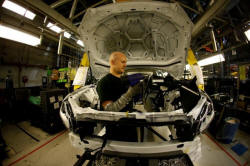|
PM May resurrects
industrial policy as Britain prepares for Brexit
 Send a link to a friend
Send a link to a friend
 [August 02, 2016]
By William James [August 02, 2016]
By William James
LONDON (Reuters) - Prime Minister
Theresa May will on Tuesday outline her bid to reshape the British
economy for a post-Brexit world, reviving the once unfashionable
concept of industrial policy 30 years after Margaret Thatcher killed
it off.
May will chair the first meeting of the "Cabinet Committee on
Economy and Industrial Strategy" in her Downing Street Offices,
bringing together the heads of 11 other ministries to set out her
vision for a state-boosted industrial renaissance.
"If we are to take advantages of the opportunities presented by
Brexit, we need to have our whole economy firing," May said ahead of
the meeting in a statement released by her office.
"We also need a plan to drive growth up and down the country – from
rural areas to our great cities."
After a referendum campaign that revealed dissatisfaction in many of
Britain's struggling post-industrial regions, May is pitching a plan
to reunite the country by raising the prospects of those who she
casts as "hard-working people".
The June 23 vote to leave the European Union has raised serious
questions about the future of the world's fifth largest economy,
with some surveys indicating a recession, a hit to consumer
confidence and a possible fall in investment.

"We need a proper industrial strategy that focuses on improving
productivity, rewarding hard-working people with higher wages and
creating more opportunities for young people so that, whatever their
background, they go as far as their talents will take them," May
said ahead of the meeting.
The challenge is to find a formula that arrests a decades-long
decline in Britain's manufacturing sector by helping firms tackle
the challenges posed by globalization without blunting the market
forces that make them competitive.
She will make a priority of developing the industries already based
in Britain - a push that could help carmakers like Jaguar Land Rover
<TAMO.NS>, GM-owned Vauxhall <GM.N> and Nissan <7201.T>, and
aerospace industry leaders like BAE Systems <BAES.L> to weather the
Brexit storm.
The strategy will also involve finding new ways to rebalance the
economy away from its reliance on the services sector, and ensure
wealth is distributed away from the prosperous south east of
England.
Whilst policy detail is scarce, the strategy is likely to combine
state-backed investment in traditional infrastructure like roads and
rail with funding for modern essentials like broadband and lower
energy costs, along with a push to train more of the highly-skilled
workers industry says it needs.
NOT PICKING WINNERS
Industrial policy has a toxic legacy in Britain.
It was once used to help failing national champions through a series
of flawed policies in the 1960s and 1970s that sought to arrest a
decline in manufacturing influence.
[to top of second column] |

Staff work on the Jaguar XJ production line at their Castle Bromwich
Assembly Plant in Birmingham November 29, 2011. REUTERS/Eddie Keogh

"We're not getting into the business of picking winners: it's more about
creating the right environment," a government source who spoke on condition of
anonymity said.
May's office said the strategy would promote a range of industrial sectors with
a focus on addressing long term productivity growth; encouraging innovation and
focusing on the industries and technologies that give Britain a competitive
advantage.
May surprised French utility EDF and China last week with a last-minute decision
to review the building of Britain's first nuclear plant in decades.
The refocusing of Britain's economic policy, for the last six years aimed at
balancing the books and heavily reliant on foreign money to replace state
infrastructure spending, also carries a potentially huge political prize.
With the opposition Labour Party, long seen as the champions of the working
classes, locked in a vicious internal ideological struggle and losing sway in
their traditional heartlands, May has an opportunity to won over those who saw
voting 'Leave' in the EU referendum a 'nothing to lose' protest vote.
"The Brexit vote and euroscepticism was strongest in former manufacturing areas,
where the industry has gone, the good jobs have gone and people feel
disaffected," said David Bailey Professor of Industry at Aston Business School.
"If May's going to do something about reconnecting, manufacturing has got to be
part of the story."
(Editing by Guy Faulconbridge)
[© 2016 Thomson Reuters. All rights
reserved.] Copyright 2016 Reuters. All rights reserved. This material may not be published,
broadcast, rewritten or redistributed.

 |